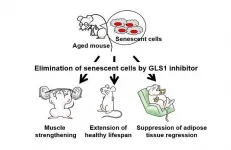(Press-News.org) FOOD SCIENCE Sweden takes first, Denmark second and Norway lags at the bottom when it comes to how much organic food is served in canteens, kindergartens and other public sector workplaces across the three Nordic nations. This, according to the results of a new report by the University of Copenhagen. The report details plenty of potential for expanding the conversion to organic food service in the Danish public sector--a topic of discussion across the EU at the moment.
Plate with potatoes and beef
The governments of Denmark, Norway and Sweden are all keen on ramping up the amount of organic food being served in their hospital kitchens, kindergartens, canteens and other institutions. Doing so benefits the environment, biodiversity and animal welfare, not to mention that consumers are demanding organic. A new report by the University of Copenhagen's Department of Food and Resource Economics compares the performance of these three countries in introducing more organic food to their public sectors.
The study reports Sweden as Scandinavia's top performer, with a 39 percent share of organic food in their public sector. Denmark comes in at 22 percent and Norway, at just 1 percent. The Swedish experience demonstrates that large volumes of organic food procurement can be achieved nationally within the public sector and that there remains plenty of potential for expansion in Denmark.
"Sweden in particular, but also Denmark in part, should to be regarded as countries with successful track records in introducing organic meals into the public sector, while Norway's efforts seem to have failed," states Professor Carsten Daugbjerg, who is behind the report.
In Sweden, organic equates with health
According to the study, the Swedish strategy has been to establish concrete targets for how much organic food should be procured by public kitchens, which municipalities then should live up to.
"At the same time, the Swedes have framed organic within a broader context, linking organic food with public health. This is as an important explanation for Sweden's success in bringing organic foods into the public sector. However, it is probably also related to Swedish municipalities being more receptive to the authority and objectives coming from Stockholm," explains Professor Daugbjerg.
According to Daugbjerg, the effort to get organic foodstuffs into public sector kitchens in Denmark has been greater than in Sweden, an effort that has succeeded in linking organic food and sustainability, for example. However, the effort to link organic foods to health has been weaker in Denmark than in Sweden.
"Within the Danish public sector, there hasn't been the same type of effort to connect public health with organic food, as there has in Sweden. In Sweden, they have a concept for healthy diets in the public sector called SMART, which links organic food to public health. There, municipalities actually use this concept in their menu planning and meal delivery," says Carsten Daugbjerg.
Demand must follow production
Within the EU, there is currently discussions on converting more farmland to organic farming. In fact, the EU would like 25 percent of its agricultural area to be organic, which would help protect the environment, among other things. To kickstart this development, there are proposals for special assistance schemes for farmers who switch from conventional to organic farming. However, according to Daugbjerg, this cannot stand on its own if the EU wants to reach its goal.
"In Denmark, there has been a great deal of focus on increasing demand as production expands. This strategy has been successful. By focusing on increasing supply through farmer incentives, there is a risk of oversupply and falling prices," he explains.
According to Carsten Daugbjerg, the Danish strategy has been successful in engaging market actors to grow the market for organic products. The collaboration between the Ministry of Environment and Food and the organic sector, in particular Organic Denmark, has played a major role here.
"Over time, efforts to stimulate demand have ranged from motivating and assisting supermarket chains in their marketing of organic products, to engaging public sector kitchen staff. This occurred while production grew. And, I think the EU can learn a lot from this," states the Professor Daugbjerg.
Alongside Sweden, Austria and Switzerland, Denmark leads within the EU when it comes to sales of organic products. Nationally these products account for just under 12 percent of Denmark's total food sales.
INFORMATION:
The FinnBrain research of the University of Turku has demonstrated for the first time that the stress the father has experienced in his childhood is connected to the development of the white matter tracts in the child's brain. Whether this connection is transmitted through epigenetic inheritance needs further research.
Evidence from multiple new animal studies demonstrates that the changes in gene function caused by environment can be inherited between generations through gametes. In particular, nutrition and stress have been proven to cause these types of changes. However, these do not alter the nucleic acid sequence of ...
Today's digital world generates vast amounts of data every second. Hence, there is a need for memory chips that can store more data in less space, as well as the ability to read and write that data faster while using less energy.
Researchers from the National University of Singapore (NUS), working with collaborators from the University of Oxford, Diamond Light Source (the United Kingdom's national synchrotron science facility) and University of Wisconsin Madison, have now developed an ultra-thin material with unique properties that could eventually achieve some of these goals. Their ...
A study published in the journal Pediatrics expands validation evidence for a new screening tool that directly engages preschool-age children during clinic visits to assess their early literacy skills. The tool, which is the first of its kind, has the potential to identify reading difficulties as early as possible, target interventions and empower families to help their child at home, according to researchers at Cincinnati Children's Hospital Medical Center.
The Reading House (TRH) is an assessment for ages 3-5 based on a specially designed children's book, which was developed by John Hutton, MD, and his team at Cincinnati Children's. Screening takes five minutes and gauges performance levels ...
An inexpensive, long-lasting and easy-to-administer vaccine against malaria could be a game-changer for millions of people living in countries where the mosquito-borne disease is endemic.
Lucie Jelinkova, a graduate student in the laboratory of Bryce Chackerian, PhD, professor in The University of New Mexico Department of Molecular Genetics & Microbiology, has identified a method that could make that dream into reality.
In research recently published in the journal NPJ Vaccines, Jelinkova and colleagues at Johns Hopkins and Flinders University in Australia report ...
Tuberous sclerosis complex (TSC) afflicts as many as two million people around the world, affecting multiple organs, including lungs, brain, skin and kidneys. In about 80 percent of cases, it causes cysts and benign tumors to form in the kidney, eventually resulting in kidney failure.
It's known that the disease is triggered by genetic mutations, but how these mutations lead to the formation of kidney cysts has been poorly understood - until now.
Nephrologist Manoocher Soleimani, MD, a professor in The University of New Mexico Department of Internal Medicine, led a team that solved the puzzle and pointed the way toward potential ...
Twitter has long provided a short, sharp take on the community's fears, anxieties and experiences. Now, data scientists have analysed 94 million tweets from the first months of the pandemic to track COVID-19's effect on mental health in NSW.
The research team used machine learning to develop a model able to capture data indicating depression, stress, anxiety and suicidal thoughts among users of the social media platform.
The aim was to tap into popular technology to help public health experts identify changes in community levels of depression over time.
The World Health Organisation highlighted early in 2020 that the pandemic would likely have a negative impact on mental health, with the disease affecting many facets of life including work, health and relationships.
Researchers from ...
Senescent cells accumulate in organs during aging, promote tissue dysfunction, and cause numerous aging-related diseases like cancer. The cells arise through a process called "cellular senescence," a permanent cell cycle arrest resulting from multiple stresses.
A collaborative research group led by Professor Makoto Nakanishi of the Institute of Medical Science, The University of Tokyo (IMSUT), and co-researchers has identified an inhibitor of the glutamate metabolic enzyme GLS1(*1) so that its administration selectively eliminates senescent cells in vivo. They confirmed that the GLS1 inhibitor eliminated senescent cells from various organs and tissues in aged mice, ameliorating age-associated tissue dysfunction and the symptoms of obese diabetes, arteriosclerosis, and ...
While scientists and historians have long surmised that etchings on stones and bones have been used as a form of symbolism dating back as early as the Middle Paleolithic period (250,000-45,000 BCE), findings to support that theory are extremely rare.
A recent discovery by archeologists from the Hebrew University and the University of Haifa alongside a team from the Le Centre National de la Recherche Scientifique in France have uncovered evidence of what may be the earliest-known use of symbols. The symbols were found on a bone fragment in the Ramle region in central ...
A City of Hope-led research team found that the same gene that increases the risk for Alzheimer's disease, ApoE4, can increase the susceptibility to and severity of COVID-19.
"Our study provides a causal link between the Alzheimer's disease risk factor ApoE4 and COVID-19 and explains why some (e.g., ApoE4 carriers) but not all COVID-19 patients exhibit neurological manifestations" said Yanhong Shi, Ph.D., director of the Division of Stem Cell Biology at City of Hope and co-corresponding author of the new study. "Understanding how risk factors for neurodegenerative diseases ...
The distinctive gut microbiome profile of a person with liver cancer linked to non-alcoholic fatty liver disease (NAFLD) could be the key to predicting someone's risk of developing the cancer, say researchers from the UNSW Microbiome Research Centre (MRC).
Their new study, published in Nature Communications recently, found the gut microbiome - the kingdom of microorganisms living in our digestive tracts - can modulate the immune response in liver cancer patients with NAFLD, in a way that promotes the cancer's survival.
While the research is still in its early stages, this finding could lead to more effective preventative and therapeutic treatments for people at risk of developing NAFLD-related liver ...




